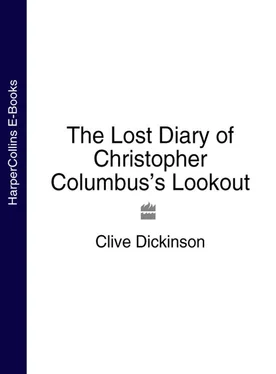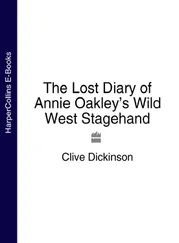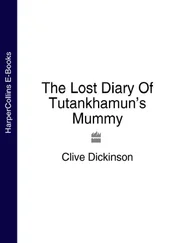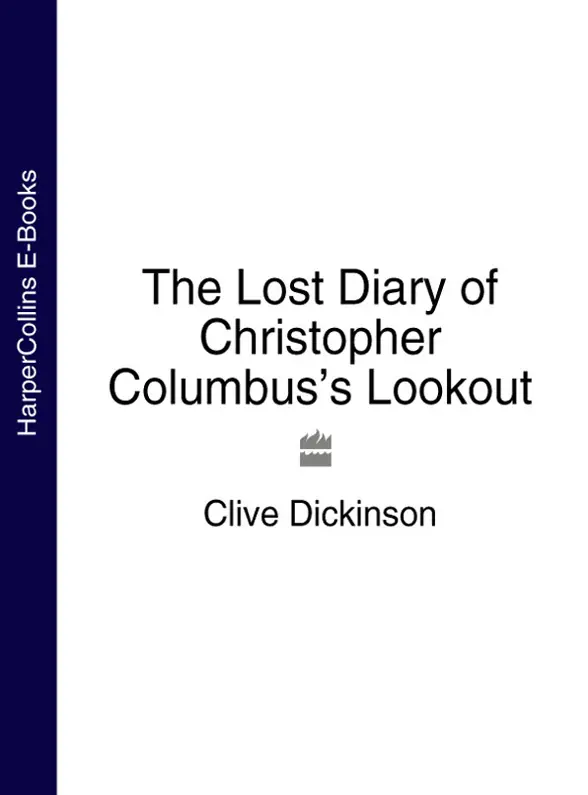
The Lost Diary ofChristopher Columbus’sLookout
Caught by Clive DickinsonIllustrated by George Hollingworth
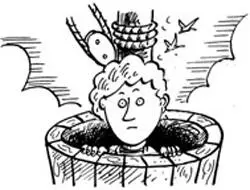

Cover
Title Page The Lost Diary ofChristopher Columbus’sLookout Caught by Clive DickinsonIllustrated by George Hollingworth
Message to Readers MESSAGE TO READERS It isn’t very often that unknown records of famous events in history are discovered by accident. However, this is exactly what happened when Clive Dickinson caught something much fishier than a fish on a recent weekend fishing trip. After trawling up several old boots and a couple of sprats, Clive pulled a small wooden barrel out of the water. Inside were pages of rough paper, smelling faintly of tobacco and covered in childlike sketches of what seemed like life on a desert island. There was writing too – in Spanish – and, from Mr Dickinson’s rudimentary knowledge of this language from his frequent holidays in Spain, it seemed to describe a sea journey. Mr Dickinson soon discovered that he had a priceless document in his hands. Although the name Christopher Columbus * did not appear on any of the pages, it was clear that the writing described the famous voyage Columbus led in 1492, across the Atlantic Ocean, to discover a new sea route to Asia. Christopher Columbus had kept his own day-by-day account of the voyage, but his original journal has been lost over the last 500 years. Could this new discovery be the only surviving record of that great event? Using the Internet, Mr Dickinson found two experts on medieval voyages who agreed to examine his find (for a very reasonable price, he says). Dr Miles Away, an Alaskan academic, and the Spanish historian Don Believavor D’Ovid confirmed that the pages in the leather folder were indeed written in 1492 by a member of Columbus’s expedition, who sailed with him on the flagship, the Santa Maria. His duties are a little unclear, but he appears to have spent some of his time as a lookout. Now, after five centuries, extracts from this remarkable first-hand account have been translated and can be published, recording one of the great turning points in world history, when the Old World and the New World met for the first time. * ‘Columbus’ is a Latin version of the discoverer’s name, which was written differently at various times of his life, depending on the country in which he was living. In Genoa and Portugal he was called Colombo. In Spain his name was written Colón. It is unlikely he ever knew himself by the English name, Christopher Columbus.
1 April 1492 – Toledo, central Spain 1 April 1492 – Toledo, central Spain ¡Ay caramba! I still can’t believe what’s happened. There are only eight years to go until the start of the new century and people are already getting worked up about it. Some are predicting that the world’s going to end and that none of us will ever see the year 1500. No-one in our household expected anything like this, though. If it wasn’t so serious, I’d think someone was playing a huge April Fool joke on everyone in Spain. But this isn’t a joke – it’s for real. We heard the news yesterday. There was a Royal Proclamation from the King and Queen and you don’t mess around with orders from the top. King Ferdinand and Queen Isabella have commanded every Jew to leave Spain by the beginning of August. The only ones allowed to stay are Jews who give up being Jews and change their religion to become Christians. I can’t see my old master, Isaac Palestino, doing that. After what he’s told me about the Jewish people – how all through their history they’ve been kicked out of one country after another – I expect he’ll pack up, leave Spain and find a new home over the sea. We’ve been waving goodbye to the Muslims recently. For hundreds of years, Muslim rulers had their own kingdom down in the south of the country. Then, three months ago, on 2 January this Year of Our Lord 1492, the great city of Granada itself surrendered to our King and Queen. That’s a date for the history books. For the first time in centuries, Spain is one country again – a Christian country. The last of the Muslims have left. Now all the Jews are going. What will be next? They say things happen in threes and if there isn’t a third amazing event in the wind this year, my name isn’t Luc Landahoya.
2 April 1492 – Toledo, central Spain 2 April 1492 – Toledo, central Spain Master Isaac called me into his study yesterday to break the news that I’ll be out of a job. He’s been so good to me, I was close to tears. He’s taught me to read. I can write. I know a bit of Latin. And I must know more about the world outside Spain than any other servant in the kingdom. When I think about the hours I’ve spent in that study, surrounded by his books, listening to him talking about the great thinkers of ancient times, hearing about the amazing places people have travelled to, I can’t believe that’s all coming to an end – and so suddenly. Master Isaac told me that he’s going to take the family to the land of the Moors in North Africa. Apparently he’s got relatives there. After what’s happened down in Granada, I don’t think a Christian like me would be too welcome in the land of the Moors. But I don’t want to stay in Toledo. Life wouldn’t be the same. I fancy a change. Perhaps I’ll try my luck in another country.
13 May 1492 – Palos, south-west Spain 13 May 1492 – Palos, south-west Spain I got here a couple of days ago. Palos wasn’t top of my list of Spain’s seaside towns. I was going to travel to a big exciting port like Seville or Cadiz. Then I found out that all the big ports were crammed full of people like my old master and his family, looking for ships to take them overseas. I could see that I’d be stuck for months, waiting at the back of the queue for all the Jews to leave, before I found a place on a ship. Master Isaac suggested that I should try somewhere smaller. Palos isn’t as popular as Seville or Cadiz. You don’t get many rich people coming down to this little town beside the Tinto River. But the weather’s warm and sunny and there are ships here. It’s close to Portugal. And it’s a good place from which to sail to Mediterranean lands or northwards to countries like France, or Holland, or even England. I’ve found somewhere to stay in the monastery of La Rabida and I reckon I’ll find what I’m looking for before too long.
23 May 1492 – Palos 23 May 1492 – Palos Today there was another command from King Ferdinand and Queen Isabella. This was a special letter from Their Majesties to the people of Palos! The town clerk read it aloud in the Church of St George, where all the important people of the town had gathered. I didn’t think it would be of much interest to me, since I’m only passing through. But I went along to find out what was going on, and hombre, am I glad I did! It seems that some fellow from the state of Genoa, across the sea in the land of Italy, has persuaded the King and Queen to put up the money for a special voyage. The King and Queen have given this Genoese sailor the rank of Captain General and they say he’s going to sail in three ships to certain parts of the Ocean Sea 1 . Call me Luc Landlubba, but that makes no sense! How can one man sail three ships at once? It sounds sort of secret (not to mention magical), so it should be exciting. I pricked up my ears, though nobody else was that thrilled. You see, the proclamation also says that because the people of Palos have been breaking the law by trading along the North African coast and upsetting the King of Portugal, they’ve got to provide this Cristobál Colón 2 (I think that’s the Captain General’s name) with two ships and all the food and equipment needed for a voyage lasting a year. They’ve got to have the ships and everything else ready in ten days’ time. No wonder the locals are fed up about it. The proclamation doesn’t make it clear where this Colón fellow is going. All it says is that he must not go southwards to the African lands, which the King of Portugal claims are his. That only leaves two directions to sail across the Ocean Sea – north and west. Either way, this could be the chance I’ve been waiting for!
Читать дальше
